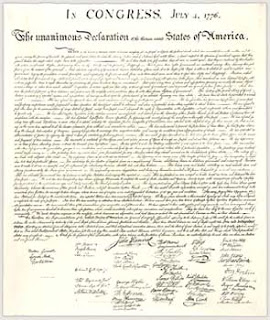Do You Know Them?
Do you know these names?
Josiah Bartlett, William Whipple, Matthew
Thornton, , Robert Treat Paine, Elbridge Gerry, Stephen Hopkins, William
Ellery, Roger Sherman, Samuel Huntington, William Williams, Oliver Wolcott,
William Floyd, Philip Livingston, Francis Lewis, Lewis Morris, Richard
Stockton, John Witherspoon, Francis Hopkinson, John Hart, Abraham Clark, Robert
Morris, Benjamin Rush, John Morton, George Clymer, James Smith, George
Taylor, James Wilson, George Ross, Caesar Rodney, George Read, Thomas McKean,
Samuel Chase, William Paca, Thomas Stone, Charles Carroll, George Wythe,
Richard Henry Lee, Thomas Jefferson, Benjamin Harrison, Thomas Nelson, Jr.,
Francis Lightfoot Lee, Carter Braxton, William Hooper, Joseph Hewes, John Penn,
Edward Rutledge, Thomas Heyward, Jr., Thomas Lynch, Jr., Arthur Middleton,
Button Gwinnett, Lyman Hall, and George Walton.
If not, you SHOULD.
These men along with John Hancock, Samuel
Adams, John Adams, Benjamin Franklin, and Thomas Jefferson (I
purposely left their names out the mix) are the 56 men who made a commitment by
signing the Declaration of Independence. Each and every one of them
risked everything they had by signing. They believed in the creation of
our nation and they staked their lives and livelihood on it. They
declared their intent to create a new nation and listed their grievances
plainly and clearly, point by point.
Consider the closing sentence of this
magnificent document: "And for the support of this Declaration, with a firm
reliance on the protection of Divine Providence, we mutually pledge to each
other our Lives, our Fortunes, and our sacred Honor."
Would
we expect this from our Congress today? Is there any member that you
think might actually pledge his/her life, fortune and sacred honor? (Does
sacred honor even exist anymore?)
Our
forefathers were NOT perfect. They were not Gods; they were human.
They were flawed. They argued. They shouted. Congress
was not a pretty place to be. (See the past isn't that unlike the
present!) But when it finally came down to the question of independence, they
unanimously agreed.
Now
I realize there were only 13 colonies at the time and this agreement did not
come without its sacrifices. The subject of slavery was removed, to keep
certain colonies "on board". Jefferson's original passage
stated in part: "He has waged cruel war against
human nature itself, violating its most sacred rights of life and liberty in
the persons of a distant people who never offended him, captivating &
carrying them into slavery in another hemisphere or to incur miserable death in
their transportation thither. This piratical warfare, the opprobrium of
infidel powers, is the warfare of the Christian King of Great Britain.
Determined to keep open a market where Men should be bought & sold, he has
prostituted his negative for suppressing every legislative attempt to prohibit
or restrain this execrable commerce." Powerful words that were
excised in order to "keep the peace." As difficult as it might
have been, Jefferson and those who despised this "particular
institution" realized that they would have to take baby steps. Form
a new nation, and then tackle other issues one by one. Something that we
SHOULD still be doing today. Moving forward towards freedom and justice
for all.
As we celebrate our 241st anniversary of independence, let's
remember those names. Those men who were willing to create something
new...the land in which we now live. Men who might be considered
"ordinary" but did something extraordinary, not alone, but together.
Remember them and honor them today...and maybe even tomorrow
and the day after and the day after. Follow their example, not to be
perfect, but to do our best and continue to uphold this truth: "all men are
created equal, that they are endowed by their Creator with certain unalienable
Rights, that among these are Life, Liberty and the pursuit of Happiness."




Comments
Post a Comment